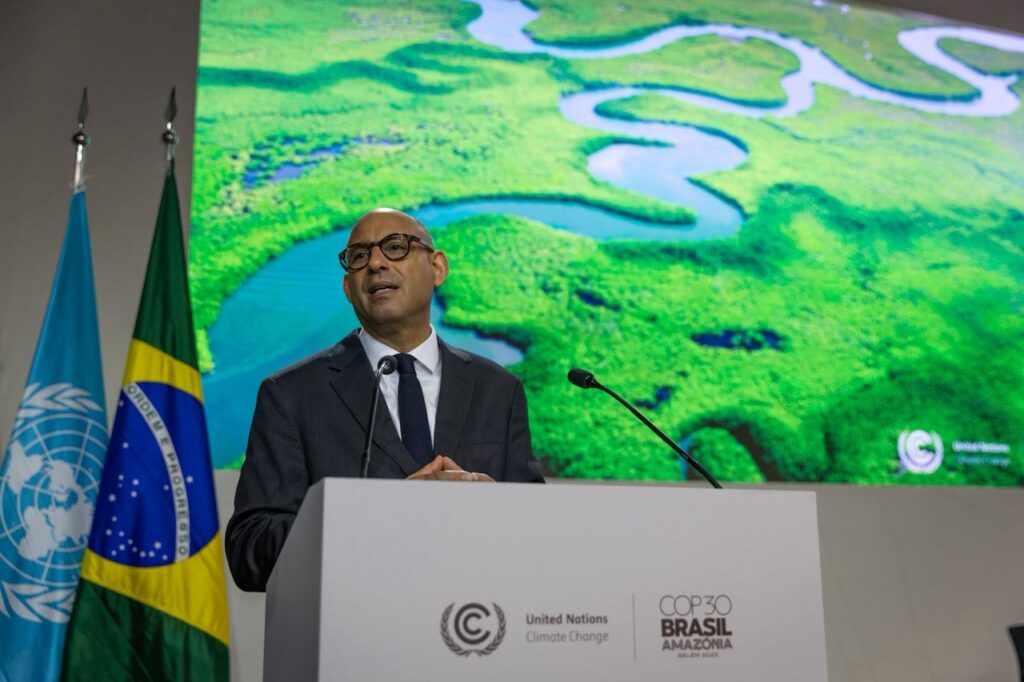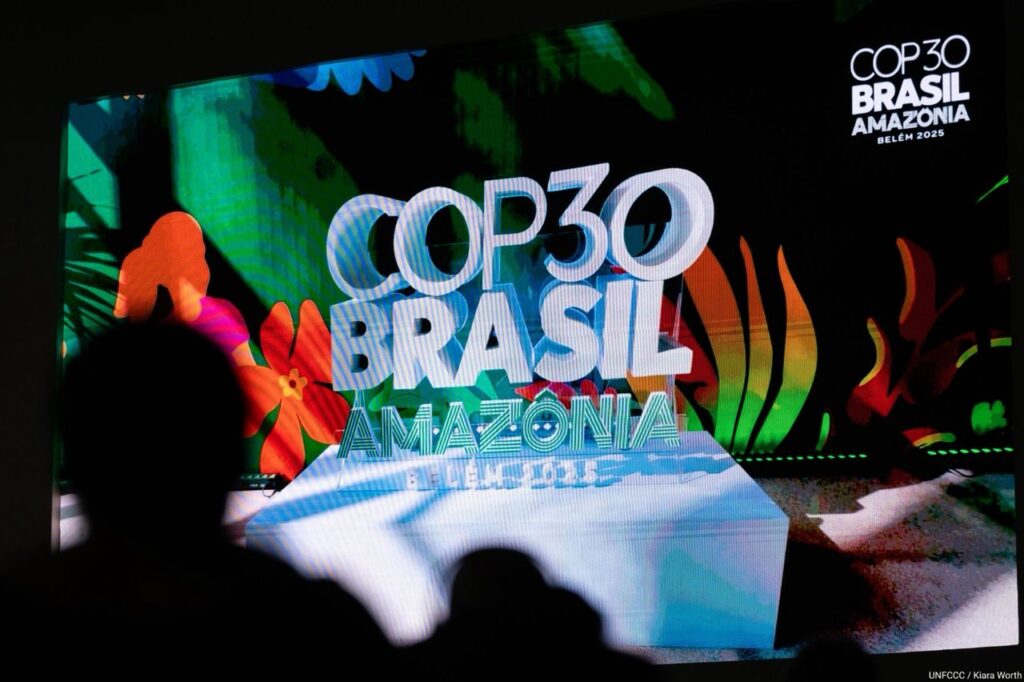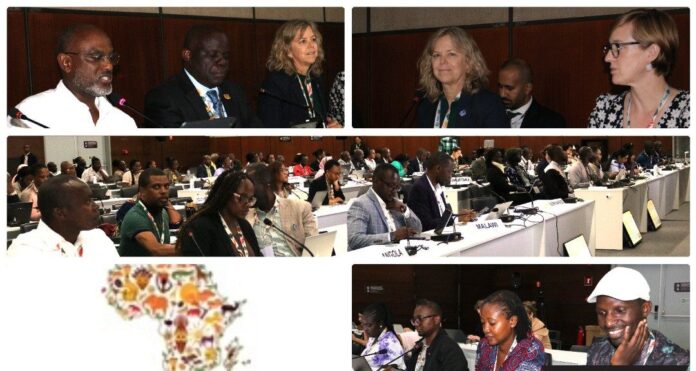African climate negotiators have outlined a unified set of priorities for the major UN climate change conference (COP30) in Belém, Brazil, highlighting climate finance as top priority.
Chair of the African Group of Negotiators on Climate Change (AGN), Dr. Richard Muyungi, says COP30 must deliver “ambitious, balanced, fair and just outcomes across adaptation, mitigation, loss and damage, and climate finance,” emphasizing that negotiations must be anchored in the latest science and the principles of equity and common but differentiated responsibilities and respective capabilities (CBDR–RC).
He warned that despite contributing less than 4% of global emissions, Africa faces rapidly intensifying climate impacts and requires outcomes that reflect its “special needs, developmental context, and heightened vulnerability.”
The negotiators called for a clear alignment between financing flows and the ambition reflected in countries’ next round of Nationally Determined Contributions (NDCs 3.0).

Key demands include concrete steps to operationalise US$1.3 trillion annually by 2030 and the US$300 billion climate finance goal.
This year’s global climate summit kicked off in the Amazonian city of Belém in Brazil, amid a warning from United Nations Climate Change Executive Secretary, Simon Stiell, that the world is not doing enough to combat the crisis, and strategic compromises over the elements of the official agenda of the summit.
At the opening plenary, the UN climate chief said the world is not moving fast enough to confront the climate crisis but was quick to note that global cooperation had at least prevented “an impossible future” of runaway heating.
“We have so much more work to do. We must move much, much faster; both in reducing emissions and in strengthening resilience,” he told delegates.

Stiell credited the Paris Agreement, adopted 10 years ago, with bending the curve of projected global heating from as high as 5°C to below 3°C, saying “it is still perilous, but it proves that climate cooperation works”.
He said success now depends on two interlinked pillars: stronger, more credible national climate plans, the Nationally Determined Contributions (NDCs); and the financing to make them possible.
“Plans without finance cannot reach their full potential,” he said.
Finance is the great accelerator
Stiell pointed to the Baku to Belém Roadmap, a new initiative that seeks to increase global climate finance from about US$300 billion a year to US$1.3 trillion by 2035, describing it as a shared investment in “stability and prosperity” and noting that countries acting fastest on clean energy would reap the greatest economic benefits.
“Every dollar invested in climate solutions brings multiple dividends; jobs, cleaner air, better health, resilient supply chains, and stronger energy and food security,” he said.
Supporters hailed the roadmap as an ambitious but necessary step to close the gap between climate pledges and real-world funding.
Brazil, hosting COP30 under President Luiz Inácio Lula da Silva, described the roadmap as “a blueprint for collective resolve.” The Brazilian delegation urged negotiators to focus on fairness and delivery rather than rhetoric.
“The science is clear, the moral imperative undeniable. What remains is the resolve,” they said.
Mohamed Adow, founder and director, Power Shift Africa, said: “COP30 must deliver the priorities for Africa and the wider developing world which are clear: we need a fair deal that delivers finance for adaptation in vulnerable countries and supports a just transition to renewable energy.
“These are not acts of charity, but investments in a stable, liveable planet. We need to see the sharing of clean energy technology by the global north with the global south, and we need to see more national climate plans published by all countries, laying out how we’re going to accelerate the momentum towards a safe and prosperous planet for us all.”
Over the next two weeks, the COP30 Presidency is understood to be positioning the summit as a political reckoning that will test whether the Paris Agreement, the crown jewel of international climate diplomacy, can still deliver results at scale.
Growing fatigue in climate process
Since 2015, global emissions have plateaued but not fallen fast enough. The 1.5°C target, the threshold scientists warn the world must stay below to avoid catastrophic consequences, is slipping out of reach.
The Belém conference comes amid growing fatigue and distrust in the global climate process, particularly over financing and equity. The Baku to Belém Roadmap aims to restore faith by setting a long-term financing goal, but key questions remain unanswered: who pays, how much, and under what terms.
Omar Elmawi, Convenor of the Africa Movement of Movements, noted: “We cannot keep sailing blindly into a climate apocalypse while pretending everything is merry. COP30 must be the turning point, where words become action, and promises become justice. Over eight billion people globally are looking at Belém to be the moment we will all look back to and celebrate and not one we curse.”
For Africa, COP30 is a moment of reckoning. The continent contributes less than 4 per cent of global emissions but bears the heaviest costs of climate change, from droughts and cyclones to collapsing agricultural yields and energy insecurity.
African negotiators have consistently argued that without predictable, affordable finance, developing nations cannot deliver on their commitments. The Baku to Belém Roadmap could be transformative if implemented fairly, ensuring that new funds reach life-saving adaptation projects in vulnerable communities, not just emissions reductions in middle-income economies.
African countries are also demanding a rebalancing of the climate finance equation to include more grants, fewer debt-driven instruments, and direct access for local governments and institutions.
The hope is that the roadmap will address long-standing inequalities that have left Africa sidelined when it comes to green investment.
Source: Kofi Adu Domfeh



